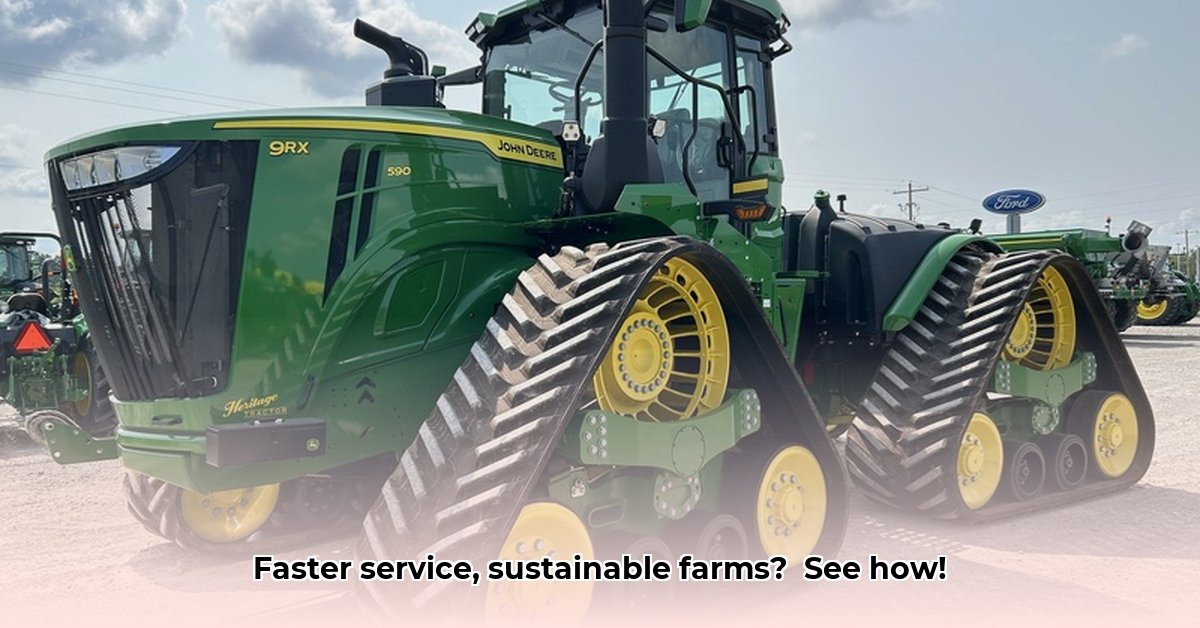
A Kansas Expansion Fuels Sustainable Agriculture
Heritage Tractor's recent expansion of its Pittsburg, Kansas, location is more than just a larger facility; it's a significant boost for sustainable farming practices across the state. This 38,500-square-foot addition dramatically increases service capabilities, promising Kansas farmers reduced equipment downtime and improved operational efficiency. This isn't simply about quicker repairs; it represents a strategic investment in the future of sustainable agriculture. The enhanced service network translates to significant environmental and economic benefits for farmers and the wider community. Learn more about Heritage Tractor's other locations, such as their Clinton, MO branch.
Keeping Kansas Farms Running Smoothly: Efficiency Meets Sustainability
Reduced downtime directly contributes to higher crop yields and more efficient farming operations. This is particularly crucial for farmers adopting environmentally friendly practices, where resource conservation is paramount. The question many farmers ask is: "How does a service center impact sustainability?" The answer is straightforward: less time spent on repairs means less fuel consumption, fewer emissions, and a smaller overall environmental footprint. This expansion directly addresses a key challenge in sustainable agriculture – maintaining operational efficiency while minimizing environmental impact. Isn't it remarkable how a simple service center upgrade can be so pivotal in a farm's sustainability journey?
Heritage Tractor's commitment to this approach is evident in their ongoing promotions on essential maintenance items. Affordable maintenance is a critical factor in the financial viability of sustainable practices, often cited as a major barrier to wider adoption. This strategic approach demonstrates a forward-thinking perspective, recognizing the fundamental link between profitability and environmental responsibility.
Expanded Reach, Serving a Wider Community
The Pittsburg expansion is not an isolated incident; it's a strategic component of Heritage Tractor's broader expansion across Kansas. With 22 new service locations added statewide, they're extending vital services to a far wider range of farmers, especially those in more remote areas. This improved accessibility is a significant advantage for farmers committed to eco-friendly farming methods, regardless of their location. Improved access to expert service is a major factor in ensuring the success of sustainable farming initiatives.
The Untapped Potential: A Call for Explicit Sustainability Initiatives
While the improved service efficiency indirectly supports sustainable agriculture, a more direct and visible commitment from Heritage Tractor would solidify their leadership role in this sector. Imagine the impact of actively partnering with organizations focused on eco-friendly equipment or offering consultations on sustainable farming techniques. This would not only enhance their brand reputation but also unlock significant growth opportunities within the burgeoning market for sustainable agricultural products. The demand for sustainably produced food is rapidly growing, creating a lucrative market niche for forward-thinking companies like Heritage Tractor. By taking this next step, Heritage Tractor could solidify their position as a true partner in building a more sustainable future.
Looking Ahead: A Vision for Greener Fields
Heritage Tractor’s Pittsburg expansion marks a significant step forward. However, its long-term success hinges on fully embracing the vital role of sustainability. Actively integrating sustainability into their brand identity – beyond merely supporting it – will transform this indirect benefit into a major competitive edge. This proactive approach will resonate with environmentally conscious consumers and potentially attract a new wave of customers prioritizing sustainable products. By taking a leadership position in sustainable agriculture, Heritage Tractor can secure a brighter future for both their business and the Kansas farming community.
Actionable Steps: A Roadmap to Sustainability
Heritage Tractor can significantly enhance its sustainability commitment by:
Promoting Sustainability: Actively communicate the environmental benefits of reduced equipment downtime resulting from their improved service capabilities. Integrate this message into their marketing materials and public relations.
Partnering with Eco-Conscious Suppliers: Prioritize sustainable parts and lubricants, emphasizing their commitment to environmental responsibility in their sourcing practices.
Educating Farmers: Offer workshops and training programs on sustainable farming best practices. This strengthens their industry expertise and fosters stronger farmer relationships.
Connecting Farmers and Consumers: Develop programs to link farmers using their services with consumers seeking sustainably produced goods. This creates mutually beneficial partnerships and reinforces their commitment to sustainability throughout the supply chain.
Navigating the Challenges: Mitigating Potential Risks
While the expansion offers significant opportunities, Heritage Tractor must proactively manage associated risks to realize its full potential:
| Risk Factor | Likelihood | Impact | Mitigation Strategy |
|---|---|---|---|
| Increased Competition | High | High | Develop specialized sustainable agriculture services; prioritize building strong customer relationships. |
| Equipment Downtime | Medium | Medium | Invest in predictive maintenance technologies; maintain strong relationships with key parts suppliers. |
| Supply Chain Disruptions | Medium | High | Secure multiple suppliers; diversify sourcing to mitigate reliance on individual suppliers. |
| Failure to Effectively Embrace Sustainability | High | High | Develop and actively promote concrete sustainability initiatives; engage with and support related organizations. |
The future of agriculture in Kansas, and beyond, depends on the adoption of sustainable practices. Heritage Tractor is well-positioned to lead this transformation. Their Pittsburg expansion is a strong beginning, but sustained success requires a bold and proactive approach to building a truly sustainable agricultural future. This involves not just providing exceptional service but actively shaping a greener, more efficient farming ecosystem.